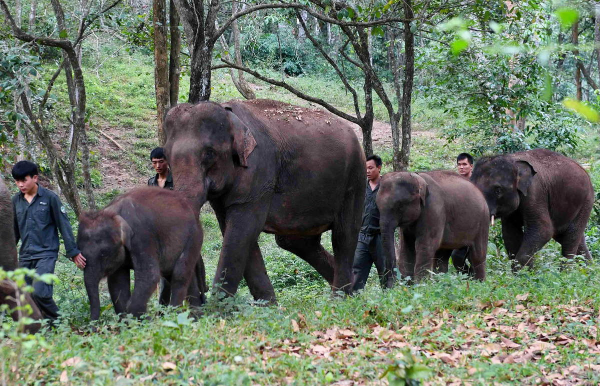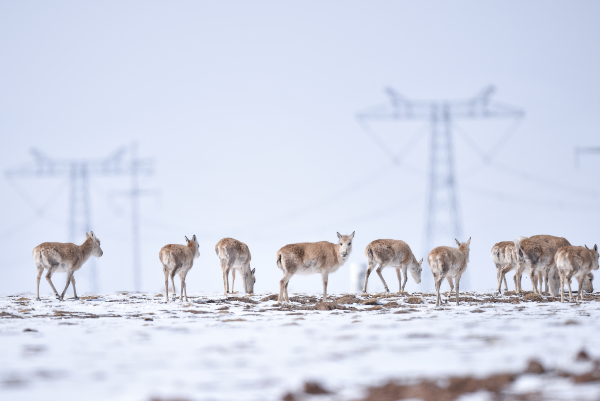Achievements seen in wildlife protection


Cameras placed for wildlife surveillance in both Southwest and Northeast China have recently captured rare activities of Asian elephants and Siberian tigers, both of which are endangered species under State protection.
On Friday, forest rangers in Yunnan province reported that a herd of Asian elephants with 17 members had traveled tens of kilometers from its habitat in Mojiang county to Yuanjiang county.
As the country's only habitat for Asian elephants, Yunnan has built a comprehensive protection and alert system for the species. The Asian elephant population in the area has surged from less than 200 in the 1980s to about 300 now.
During the group's two-day journey, drones and cameras helped record its route and activities, and alerts were sent to local residents based on this information. As a result, no conflicts were reported between the elephants and local residents.
Last Wednesday, surveillance cameras at the Hunchun branch of the Northeast China Tiger and Leopard National Park in Jilin province revealed that a Siberian tiger and her three offspring were roaming in the park. One of the tiger cubs even came close to the camera and sniffed at it.
The park, which is in Jilin and Heilongjiang provinces, has been listed since 2015 as one of the country's 10 pilot national parks. In the past five years, the Siberian tiger and Amur leopard-two species noted as critically endangered on the International Union for Conservation of Nature's Red List of Threatened Species-have seen their numbers steadily increase. The total population of the Siberian tigers in the wild now stands at 27, and there are 42 Amur leopards.

"Currently, tigers and leopards can be seen at almost all of the mountains in the park," said Feng Limin, a biologist from Beijing Normal University in charge of the park's wildlife surveillance work.
"We've kept tracking this tiger mother for a long time. She gave birth to three cubs last May and these young tigers are all in a very healthy condition."
The annual Earth Day falls on Thursday, and its theme this year is "Restore Our Earth". Countries are being urged to focus on restoring the world's ecosystems through natural processes, emerging green technologies and innovative thinking.
Zhang Zhizhong, director of the wildlife protection department at the National Forestry and Grassland Administration, said multiple departments and social organizations in China have made steadfast conservation efforts to protect the country's biodiversity by focusing on habitat protection, afforestation and wildlife conservation.
As one of 17 countries in the world with mega-biodiversity, China is home to nearly 10 percent of all plant species and 14 percent of animals on the planet. Between 2016 and 2020, the country established many nature reserves that now cover 18 percent of its land area and protect 90 percent of the country's plants and 85 percent of its wild animals.
In October, the 15th meeting of the Conference of the Parties to the Convention on Biological Diversity, also known as COP 15, which will be the biggest biodiversity summit in a decade, is scheduled to take place in Kunming, Yunnan province.
On Tuesday, President of the 75th Session of the UN General Assembly Volkan Bozkir pledged that efforts must be made to make progress on the "Road to Kunming", reaffirming his strong support for boosting biodiversity.
Making progress
"We must continue to make progress on the 'Road to Kunming' and the goal of a 2020 Framework on Biodiversity," he said on Tuesday in remarks addressed to the high-level Raising Ambition for Nature event, organized by the Group of Like-Minded Megadiverse Countries, a group of countries with the majority of Earth's species.
Zhang Jun, China's permanent representative to the UN, told the same event that a high level of political importance must be attached to the COP15.
"Biodiversity is the foundation for human survival and development. We should explore a path of harmonious coexistence between man and nature through COP15," he added.
"There is only one Earth. We must protect the ecological environment as much as we take care of our eyes. We must take environmental issues seriously at all times, not only during meetings and conferences," he said.
Xinhua contributed to this story.




